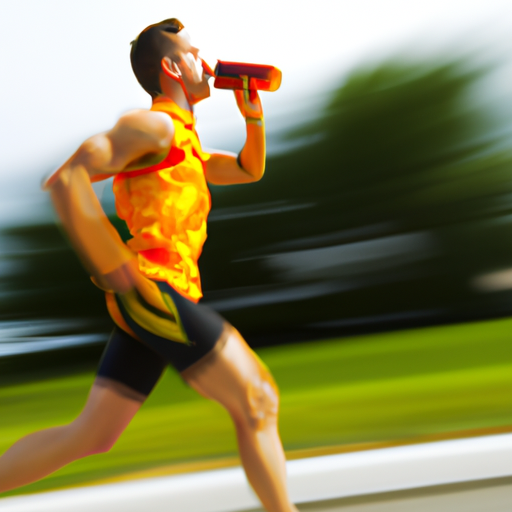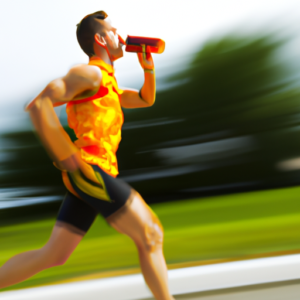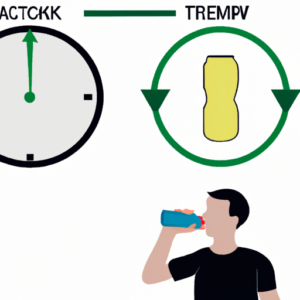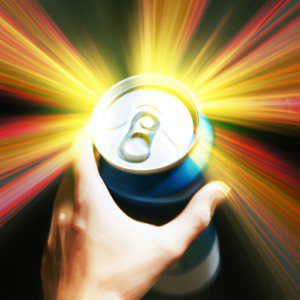Recent studies have suggested that energy drinks may be effective in enhancing physical performance.
This article explores the potential role of these beverages in improving the body’s ability to perform during exercise and sports activities.
It provides an overview of the effects of consuming energy drinks on physiological processes, as well as a discussion of their specific benefits for athletes.
An analysis is also presented regarding safety considerations associated with drinking energy drinks prior to or during physical activity.
These findings are then summarized, offering insight into how energy drinks can contribute to improved physical performance.
The primary components of popular energy drink formulations include carbohydrates, amino acids, vitamins, minerals, caffeine and other stimulants such as guarana and taurine.
Caffeine has been demonstrated to produce short-term increases in alertness and cognitive function.
Additionally, several studies suggest that it may improve strength output by increasing concentration levels during strenuous exercise bouts.
The additional ingredients contained within many energy drinks can further impact metabolic pathways involved in aerobic metabolism and anaerobic glycolysis.
Thus, these products may provide an ergogenic advantage when consumed before or during athletic events or training sessions.
Components Of Energy Drinks
The consumption of energy drinks has become increasingly popular in recent decades, with many people believing they help to enhance physical performance. While the jury is still out on the effectiveness of these beverages for this purpose, it is important to understand their components and how they may affect our bodies.
Energy drinks are usually made up of water, sugar or artificial sweetener content, flavorings such as caffeine, taurine, guarana seed extract and herbal extracts like ginseng root extract. In terms of calories per serving size, most energy drinks contain between 30-50 kcal from the added sugars or artificial sweeteners present in them.
These ingredients have been selected for their purported energizing effects on the body. Caffeine has long been known to stimulate alertness and provide a mental boost while other ingredients such as taurine can improve moods and reduce feelings of fatigue.
It is also worth considering that not all energy drinks are created equal when it comes to nutrition value; some brands include more preservatives than others or higher amounts of vitamins or minerals which could potentially lead to greater health benefits if consumed in moderation.
As such, it is important to take into account both the potential benefits and risks associated with consuming different types of energy drinks before making an informed decision about whether to use them as part of your diet plan.
Effects Of Caffeine On Performance
Caffeine has been studied for its effects on physical performance. Caffeine is absorbed into the bloodstream and metabolized by enzymes in the liver within 30 minutes of ingestion, thus making it a fast-acting stimulant. Due to this quick absorption rate and metabolic process, caffeine provides an immediate boost in energy that can help with physical exertion or mental focus.
The primary mechanism of action associated with improved physical performance from caffeine consumption is based on two factors: increased alertness and fat oxidation. In terms of alertness, caffeine improves attention span which allows athletes to maintain optimal levels of concentration during training sessions or competitions.
Additionally, when ingested prior to exercise, caffeine causes body fat to be used as fuel instead of muscle glycogen stores leading to enhanced endurance capabilities (i.e., greater fat oxidation).
Studies have suggested that individuals who habitually consume small amounts of caffeine may benefit more than those who are not accustomed to regular intake due to their bodies’ ability to adapt over time and become tolerant towards the substance. Thus, habitual drinkers gain greater competitive advantage since they require lower dosages yet achieve similar results compared to non-habitual consumers taking higher doses.
Furthermore, findings suggest that moderate intakes (~4 mg/kg) provide ergogenic benefits without any adverse health consequences related to energy balance.
Potential Benefits For Athletes
1. Studies have shown that athletes who supplemented their diets with energy drinks had improved endurance compared to those who did not.
2. The increased levels of caffeine and carbohydrates in energy drinks have been shown to improve cognitive performance and reaction time, allowing athletes to perform at higher levels for longer periods of time.
3. Additionally, energy drinks can help athletes to stay better hydrated during exercise, as the added electrolytes can help increase the absorption of fluids.
4. Further research is needed to better understand the long-term effects of energy drinks on physical performance in athletes.
Increased Endurance
The potential benefits of energy drinks for athletes have long been debated, particularly with regards to increased endurance.
Recent research suggests that consuming these beverages prior to exercise can lead to a short-term increase in physical performance.
A study conducted on trained cyclists found that those who had consumed an energy drink were able to cycle at higher speeds and for significantly longer durations than the placebo group.
In addition, it was noted that the participants experienced improved mental focus and concentration during their ride.
The results provide evidence that drinking such beverages prior to engaging in physical activity may improve both physical and cognitive performance in trained athletes; however, it is important to consider any potential side effects before use as well as ensuring adequate hydration levels are maintained throughout exercise sessions.
Improved Hydration
Adequate hydration is essential for athletes to maintain peak performance, and energy drinks may be a convenient source of fluids.
Studies have shown that consuming an energy drink prior to exercise can lead to improved hydration levels due to the presence of electrolytes in some formulations.
This can result in increased alertness and improved digestion which are important factors for optimal physical activity.
Additionally, it appears that when consumed in moderate quantities, such beverages can assist with enhanced endurance during intense training sessions or competitions.
Therefore, considering the potential benefits associated with improved hydration from energy drinks, they may provide an advantageous supplement for active individuals looking to maximize their performance.
Safety Considerations
The potential safety considerations associated with energy drinks are of particular importance to consider when evaluating their role in enhancing physical performance.
Energy drink consumption may be restricted for individuals with specific dietary restrictions or health risks due to the high levels of caffeine and other ingredients, such as taurine and guarana, which function as stimulants.
Consumption should also be limited among adolescents and young adults given that they are more susceptible to the potential adverse effects resulting from excessive intake.
Elevated blood pressure is a notable side effect associated with regular energy drink use, as well as numerous cardiovascular complications including irregular heartbeats and palpitations.
Furthermore, excess consumption has been linked to increased risk of seizures, headaches, insomnia and gastrointestinal issues.
Several studies have suggested that while these beverages can improve cognitive performance, they can also cause feelings of anxiety and jitteriness if consumed in large amounts over long periods of time.
Thus, it is important to exercise caution when using energy drinks for purposes related to improving physical performance.
Moderation appears key; both timing and quantity should be considered carefully when deciding how much of this beverage an individual consumes on a daily basis.
It is prudent for those who choose to consume energy drinks regularly to do so under medical supervision to ensure overall safety and optimal health outcomes.
Summary Of Findings
To sum up, the evidence for energy drinks as an enhancer of physical performance is unclear.
While some studies suggest that certain ingredients like caffeine can improve endurance and strength, there are safety concerns surrounding increased sugar content and electrolytes consumption.
Furthermore, the risks associated with combining energy drink products with alcohol or other drugs need to be taken into account when considering their use in sports and exercise contexts.
Overall, more research is needed to definitively conclude whether energy drinks have a positive effect on physical performance.
At present, athletes should take caution when consuming these beverages and consider alternative sources of hydration before relying solely on energy drinks.
Moreover, healthcare professionals should adequately educate individuals about potential risks related to frequent intake of high-sugar beverages such as energy drinks.
In summation, while it remains uncertain if energy drinks actually enhance physical performance, one must acknowledge the potential risks involved in their usage due to elevated sugar levels and electrolyte imbalance.
Therefore, people who pursue athletic activities may benefit from consulting medical experts prior to regularly drinking these types of beverages.
Frequently Asked Questions
What Are The Best Energy Drinks To Consume Before Exercise?
When considering energy drinks to consume before exercise, it is important to consider the sugar content and heart rate effects.
Studies have shown that individuals who consume low-sugar energy drinks prior to exercise are able to maintain a lower resting heart rate throughout the entire workout session than those who do not consume any type of energy drink at all.
Furthermore, research suggests that high-sugar energy drinks tend to be less beneficial in terms of physical performance when compared with their lower sugar counterparts due to an increase in blood glucose levels which can cause fatigue during exercise.
Therefore, based on these findings, it appears that low-sugar energy drinks may offer the best benefits for athletes wishing to take advantage of improved physical performance before exercising.
How Much Caffeine Should I Consume To Maximize Performance?
Caffeine is a popular stimulant, found naturally in coffee beans and other plant sources. It can also be synthesized for use as an additive in many foods and beverages.
While some studies suggest that caffeine has ergogenic effects (i.e., improvements to physical performance) when taken before exercise, the optimal dose of caffeine for maximizing performance remains unclear due to conflicting results from research studies and lack of consensus on safety concerns based on ingredient composition.
Thus, it is important to consider individual tolerance levels and consult with healthcare providers prior to consuming any type of caffeine-containing supplement or energy drink to maximize physical performance while minimizing potential risks associated with consumption.
Are There Any Natural Alternatives To Energy Drinks?
As athletes strive for better performance and results, many have turned to energy drinks as an aid. However, with the health risks associated with them and their synthetic components, natural alternatives are being sought after.
Hydration benefits, muscle recovery, and improved performance can be found through a range of substances such as electrolytes, amino acids, carbohydrates and vitamins that offer natural sources of energy. Scientists in nutrition and exercise science advise athletes to investigate these resources before depending on artificial ingredients to give them a boost when needed.
By doing so they can ensure optimum physical performance without putting themselves at risk.
How Long Do The Effects Of Energy Drinks Last?
The effects of energy drinks can be measured in terms of their vitamins content and hydration levels.
Studies have shown that these drinks contain ingredients such as caffeine, taurine, guarana and B-vitamins which are known to provide short-term boosts in performance.
However, the results from studies concerning how long the effects from energy drinks last vary widely.
Some suggest a time period ranging from 15 minutes up to 5 hours while others report an increase of alertness for approximately 6-8 hours after consumption.
Therefore, it appears that the length of time these drinks remain effective is highly dependent on individual factors.
Are Energy Drinks Suitable For Children?
The unsettling truth of energy drinks is that they contain a range of ingredients, such as caffeine and taurine, which can have potentially adverse effects on the health of children.
The age old adage ‘safety first’ is especially true when it comes to energy safety for youngsters.
Caffeine consumption in minors has been linked to negative moods and even poor sleep quality; whereas numerous studies suggest that long-term exposure to stimulants may lead to more serious issues with cardiovascular health.
As nutritionists and exercise scientists we must be aware of the risks associated with giving these beverages to young people and ensure their safety by taking preventative measures.
Conclusion
In conclusion, the consumption of energy drinks before exercise can significantly improve physical performance.
However, individuals should be aware that excessive caffeine consumption may pose certain health risks and can lead to adverse effects such as insomnia and restlessness.
Furthermore, natural alternatives to energy drinks may offer a safer approach for those wishing to gain an energizing boost without consuming large amounts of stimulants.
Ultimately, it is important for athletes and coaches to consider the potential benefits and risks when deciding whether or not energy drinks are suitable for their needs.
Similes have been used throughout this article to help readers understand the effects of energy drink consumption on physical performance; thus providing a more comprehensive overview of its use in athletic contexts.




